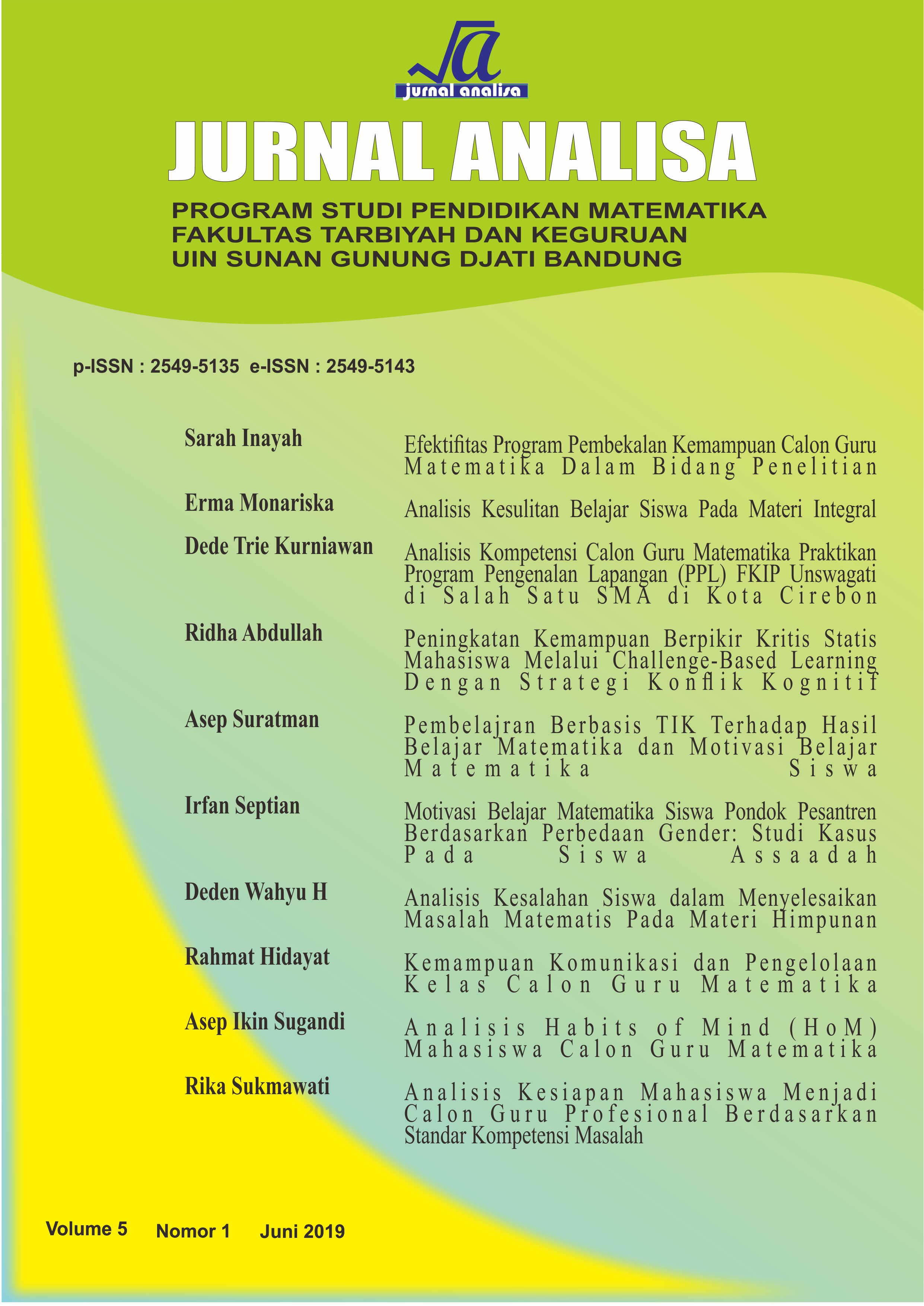Peningkatan kemampuan berpikir statistis mahasiswa melalui challenge-based learning dengan strategi konflik kognitif
DOI:
https://doi.org/10.15575/ja.v5i1.4808Keywords:
Berpikir Statistis, Challenge-Based Learning, Konflik KognitifAbstract
Tujuan penelitian mengkaji secara komprehensif perbedaan peningkatan kemampuan berpikir statistis mahasiswa calon guru melalui pembelajaran Challenge-Based Learning dengan Strategi Konflik Kognitif. Metode yang digunakan adalah Quasi Eksperiment dengan desain penelitian Nonequivalent Pretest-Posttest Control Group, melibatkan sampel dua kelas mahasiswa Sekolah Tinggi Agama Islam di Sumedang. Instrumen yang digunakan tes berpikir statistis. Hasil penelitian menunjukkan adanya perbedaan peningkatan kemampuan berpikir statistis antara mahasiswa yang pembelajaran challenge-based learning dengan strategi konflik kognitif memperoleh peningkatan lebih tinggi dari mahasiswa yang pembelajarannya ekspositori, baik secara keseluruhan mahasiswa maupun berdasarkan pengetahuan awal statistis. Terdapat interaksi antara jenis (pembelajaran challenge-based learning dengan strategi konflik kognitif dan ekspositori) dan kategori pengetahuan awal statistis (pandai, cukup, lemah) terhadap peningkatan kemampuan berpikir statistis mahasiswa. Pembelajaran berbasis tantangan dengan strategi konflik kognitif dapat memfasilitasi proses konflik, proses penemuan, proses interaksi sosial, dan proses reflektif mahasiswa sehingga kemampuan berpikir statistis mahasiswa lebih baik dari pada pembelajaran ekspositori.References
Paper dalam jurnal
Chance, B. L. (2002), Components of statistical thinking and implications for instruction and assessment. Journal of statistical education, 10. (3). 21-35.
Choi, H. J., & Johnson, S. D. (2005). The effect of context-based video instruction on learning and motivation in online courses. American Journal of Distance Education, 19 (4), pp. 215-227.
DelMas, Robert C. (2002). Statistical Literacy, Reasoning, and Learning: A Commentary. Journal of Statistiks Education, 10 (3).
Diezmann, C, M. (2005). Challenging mathematically gifted primary students. Australasian Journal of Gifted Education, 14 (1), pp. 50-57.
Eunsil, C., Jiyoung, L., & Haeyoung, K. (2014). Statistical methods used in articles published by the journal of periodontal and implant Science. Journal of of Periodontal and Implant Science, 44(06), 288-292.
Garfield, J., & Ahlgren, A. (1988), Diffieculties in learning basic concepts in probability and statistics: implications for research. Journal for research in mathematics education Vol. 19 No.1.
Garfield, J. (1995), How students learn statistics. Journal international statistical review. 63. (1). 25-34.
Jones, G.A., Langrall, C. W., Thornton, C. A., & Mogill, A.T (1999), Students probabilistic thinking in instruction. Journal for research in mathematics education, 30, 487-519.
Jones, G.A., Thornton, C.A., Langrall, C.W., Mooney, E., Perry, B., & Putt, I. (2000). A framework for characterizing students’ statistical thinking. Journal Mathematical Thinking and Learning, 2, 269-308.
Jones, G.A., Langrall, C.W., Thornton, C.A., Mooney, E.S., Wares, A.S., Jones, M.R., Perry, B., Putt, I.J., & Nisbet, S. (2001). Using students’ statistical thinking to inform instruction. Journal of Mathematical Behavior, 20, 109-144.
Kalaian, S. A., & Kasim, R. M. (2014). A meta-analytic review of studies of the effectiveness of small-group learning methods on statistics achievement. Journal of Statistics Education, 22(1)
Lee, G., Kwon, J., Park, S. S., Kim, J. W., Kwon, H.G.,& Park, H. K. (2003). Developmentof an instrument for measuring cognitive conflik in secondary-levelscience classes. Journal of Research in Science Teaching. Vol 40, No. 6, pp.19-27.
Maron, A, I. (2016). Priorities of teaching mathematics in universities IEJME–International Electronic Journal of Mathematics Education, 11 (9), pp. 3339-3350.
Shabiralyani, G., Hasan, K. S., Hamad, N., & Iqbal, N. (2015). Impact of visual aids in enhancing the learning process case research: district dera ghazi khan. Journal of Education and Practice, 19(6), 226-223.
Shaidullina, A. R., Pavlova, N. A., Minsabirova, V. N., Burdukovskaya, E. A., Yunusova, A. B., Letyaev, V. A., Afanasev, A. S. (2015b) Integration processes in education: classification of integration types. Journal Review of European Studies, 7(4), 27-31.
Surijah, A, E., Anggara, Yanti, Sari, Hartika, Ramayanti, Sugiri, (2018) Komik sebagai media pembelajaran statistika. Jurnal Psikologi Insight, 2 (2), 39-50
Susilawati, W., Suryadi, D,. & Dahlan, J. A. (2017). The improvement of mathematical spatial visualization ability of student through cognitive conflict strategy. International Electronic Journal of Mathematics Education (IEJME-ISSN: 1306-3030). Vol.12 (5), pp. 155-166.
Buku
Ben-Zvi, D & Friedlander, A. (2010), Statistical a technological environment. rehovot, Israel: the weizmann institute of science.
Garfield, J. (1999), Thinking about statistical reasoning, thinking, and literacy. paper presented at firstnannual rountable on statistical thinking, reasoning, and literacy.
Gold, B., Simons, R. A. (2008). Proof and other dilemmas mathematics and Philosophy. The Mathematical Association qf America. Inc.
Johnson, Laurence F.; Smith, Rachel S.; Smythe, J. Troy; Varon, Rachel K. (2009). Challenge-based learning: an approach for our time. Austin, Texas: The New Media Consortium.
Prosiding
Verhoeven, P. (2006) Statistics education in the Netherlands and flanders: an outline of introductory courses at universitas and colleges. in icots-7 conference proceedings.
Disertasi
Ismaimuja (2009), Kemampuan berpikir kritis dan kreatif matematis siswa SMP melalui pembelajaran berbasis masalah dengan strategi konflik kognitif. Disertasi UPI Bandung. Tidak dipublikasikan
Martadiputra, B.A.P. (2012), Meningkatkan kemampuan berpikir statistik mahasiswa S1 pendidikan matematika melalui pembelajaran meas yang dimodifikasi. Disertasi PPS UPI tidak dipublikasikan.
Susilawati, W. (2017) Pengaruh pembelajaran berbasis tantangan dengan strategi konflik kognitif terhadap peningkatan kemampuan visualisasi spasial, berpikir lateral dan kegigihan matematis mahasiswa. Bandung. Disertasi PPS UPI.
Downloads
Published
Issue
Section
License
Authors who publish in Jurnal Analisa agree to the following terms:
1. Authors retain copyright and grant the journal right of first publication with the work simultaneously licensed under a Attribution-ShareAlike 4.0 International (CC BY-SA 4.0) License that allows others to share the work with an acknowledgment of the work's authorship and initial publication in this journal.
2. Authors are able to enter into separate, additional contractual arrangements for the non-exclusive distribution of the journal's published version of the work (e.g., post it to an institutional repository or publish it in a book), with an acknowledgment of its initial publication in this journal.
3.Authors are permitted and encouraged to post their work online (e.g., in institutional repositories or on their website) prior to and during the submission process, as it can lead to productive exchanges, as well as earlier and greater citation of published work (See The Effect of Open Access).
